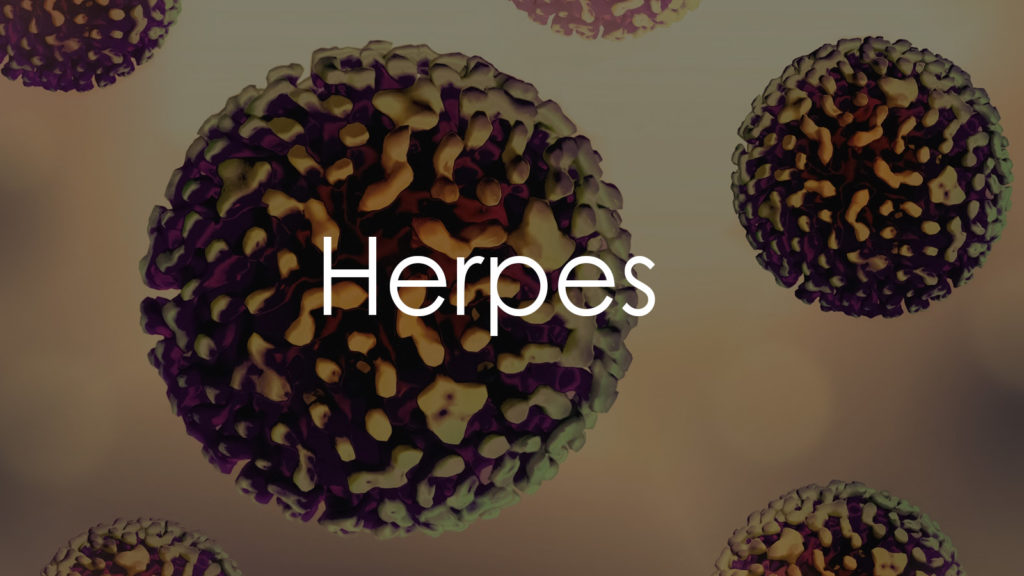Herpes refers to a group of viral infections caused by the herpes simplex virus (HSV). There are two main types of the virus: HSV-1, which primarily causes oral herpes, and HSV-2, which primarily causes genital herpes, though both types can affect either area. Herpes infections are characterized by episodes of blisters and sores in the affected areas. Despite the stigma often associated with herpes, it is a common condition affecting millions worldwide. Once infected, the virus remains in the body for life, lying dormant in nerve cells and occasionally causing outbreaks. Understanding the causes, transmission, and symptoms of herpes is crucial for effective management and preventing its spread.

Causes
Herpes is caused by two types of the herpes simplex virus:
- HSV-1 (Herpes Simplex Virus Type 1): Typically responsible for oral herpes, causing cold sores or fever blisters around the mouth. Transmission can occur through oral secretions or sores on the skin and can be spread through kissing or sharing objects like toothbrushes or eating utensils.
- HSV-2 (Herpes Simplex Virus Type 2): Usually causes genital herpes, transmitted through sexual contact with someone infected with the virus. HSV-2 is more commonly associated with genital sores but can also be spread to the mouth through oral-genital contact.
Both types of herpes virus are highly contagious, especially when sores are present, but can also be transmitted when no sores are visible.
Symptoms
Symptoms of herpes can vary widely from person to person. Some may experience mild symptoms or none at all, while others have more severe outbreaks. Common symptoms include:
- Painful Blisters or Sores: On the lips, mouth, genital area, or anus. These can be preceded by itching, tingling, or discomfort in the area.
- Flu-like Symptoms: Especially during the first outbreak, which can include fever, body aches, and swollen lymph nodes.
- Urination Pain: Particularly with genital herpes, which may cause pain or a burning sensation during urination.
- Recurrent Outbreaks: Many people experience repeat episodes of sores; these are usually less severe than the initial outbreak. HSV-1 outbreaks can be triggered by factors like stress, hormonal changes, or illness, while HSV-2 recurrence may be influenced by sexual activity or immune system pressures.
It’s important to seek medical advice if you suspect you have herpes or have been exposed to the virus, as effective treatments are available to manage symptoms and reduce the risk of transmission.
Diagnostics
The diagnosis of herpes involves a combination of clinical assessment and specific tests:
- Physical Examination: A healthcare provider may diagnose herpes based on the appearance of sores if they are present.
- Viral Culture: Taking a sample from a sore and testing it in a lab to see if the herpes virus grows. This method is most effective when the sore is new.
- Polymerase Chain Reaction (PCR) Test: This test identifies herpes DNA from a sample taken from a sore, blood, or spinal fluid, making it useful for diagnosing both HSV-1 and HSV-2, as well as identifying herpes without visible symptoms.
- Blood Tests: These tests detect antibodies to the herpes virus, indicating a past or present infection. They can differentiate between HSV-1 and HSV-2 but might not be useful immediately after exposure as antibodies take time to develop.
Treatment
There is no cure for herpes, but treatments are available to manage symptoms and reduce the risk of transmission:
- Antiviral Medications: Medications such as acyclovir, famciclovir, and valacyclovir can help heal sores more quickly, reduce the frequency of outbreaks, and, when taken continuously, may reduce the likelihood of transmitting the virus to others.
- Topical Treatments: For oral herpes, topical antiviral creams may provide symptom relief, although their effectiveness is less than oral medications.
- Pain Relief: Over-the-counter pain relievers like ibuprofen or acetaminophen can help alleviate pain associated with outbreaks.
- Home Care Measures: Warm baths, wearing loose-fitting clothing, and keeping the affected area clean and dry can help soothe symptoms during an outbreak.
Prevention
- Avoid direct contact with sores: This includes not kissing or engaging in sexual activity with someone who has an outbreak.
- Use Barrier Protection: Condoms can reduce the risk of transmission but may not cover all affected areas.
- Avoid sharing personal items: Such as lip balm or towels, with someone who has an active outbreak.
Managing herpes effectively requires a comprehensive approach, including medical treatment and lifestyle adjustments, to minimize outbreaks and reduce the risk of transmission.
Complications
While herpes is typically manageable for most people, certain complications can arise, particularly in individuals with weakened immune systems:
- Neonatal Herpes: Infants born to mothers with active genital herpes during childbirth can be exposed to the virus, leading to severe complications, including brain damage, blindness, and even death.
- Herpetic Whitlow: A painful infection resulting in sores on the fingers or around the fingernails, commonly affecting healthcare providers exposed to the virus.
- Herpes Keratitis: An infection of the eye that can lead to corneal blindness if left untreated.
- Herpes Meningitis or Encephalitis: Although rare, the herpes virus can cause inflammation of the brain or surrounding membranes, which can be life-threatening.
- Increased Risk of HIV Transmission: Genital herpes can increase the risk of both acquiring and transmitting HIV, the virus that causes AIDS.
Conclusion
Herpes, caused by the herpes simplex virus, remains a common global health concern due to its highly contagious nature and the potential for lifelong recurrence. While there is no cure, effective management strategies, including antiviral treatments and lifestyle modifications, can help control symptoms, reduce the frequency of outbreaks, and minimize the risk of transmission. Awareness and understanding of the virus, its transmission routes, and preventive measures play crucial roles in reducing the impact of herpes on individuals and communities. Early diagnosis and treatment are key to managing herpes and preventing its complications, highlighting the importance of seeking medical advice if infection is suspected.